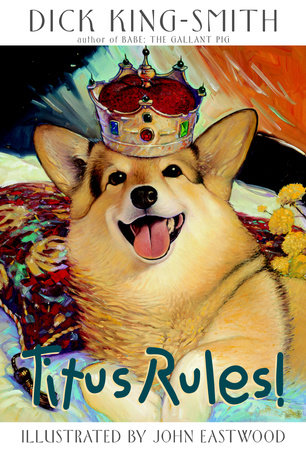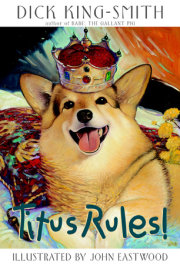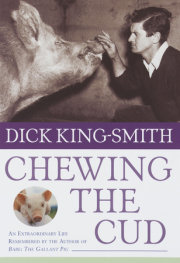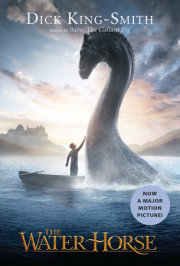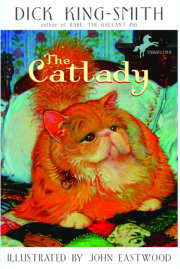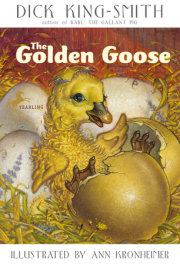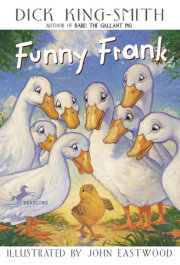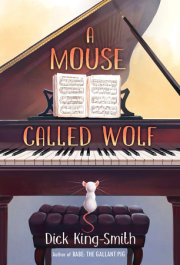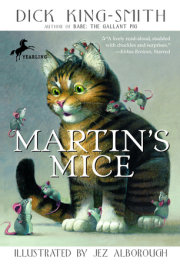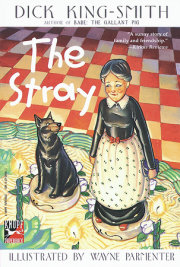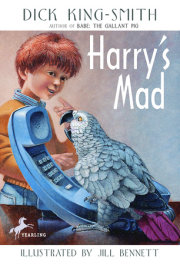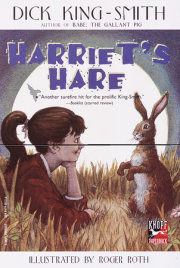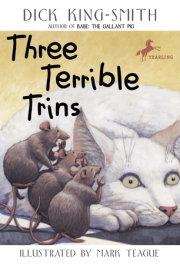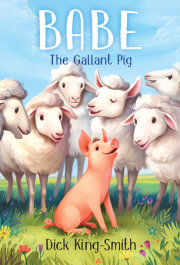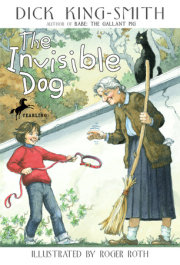Chapter One
In an armchair in the great high-ceilinged drawing room sat a woman, surrounded by dogs. Some sat in other chairs, some on the hearthrug, and one, the youngest and not much more than a pup, on the woman's lap.
All the dogs were of the same breed. All of them looked up as the door of the room was opened by a tallish man with a strong nose and receding hair and rather bristly eyebrows, who strode in with a military gait that suggested he might once have been a soldier, or perhaps a sailor.
At sight of him, the youngest dog jumped off the woman's lap and rushed forward, getting between the man's legs and almost tripping him up.
The bristly eyebrows came together in a frown. "Good heavens, Madge!" said the man angrily. "Do we have to have these fat little brutes under our feet all the time?"
The woman rose to her full height (which was not very great). Unlike her husband, she was plump and had thick gray hair, set in neat permanent waves.
Like him, she looked angry. "There would be no problem if you looked where you were going," she said in a high voice, "and I'll thank you not to refer to my dogs as fat little brutes. They are not fat. They simply have short legs, like all corgis."
Husband and wife stood glowering at one another in that grumpy way that long-married people sometimes do, but before anything else could be said, there was a knock on the door and into the drawing room came a footman carrying a tray. This he placed upon a table before withdrawing, backward.
Once the door was closed, the tallish man said, "You feed 'em too much, Madge, that's the trouble."
"That is your opinion, Philip," said the Queen icily, "which I would be glad if you would keep to yourself. Do you want a cup of coffee?"
"No thanks, I fancy something stronger," the man said, and he withdrew, frontward.
The Queen poured herself a cup of coffee and then, taking from the tray a plate of cookies, proceeded to feed them to the corgis. "Custard creams, my dears," she said, smiling. "Your favorites." And she gave an extra one to the youngest corgi.
"Not your fault," she said to him. "He wasn't looking where he was going."
Later, when the Queen had finished her coffee and left the room, the mother of the youngest corgi jumped into her chair, warm from the imprint of the royal bottom, and her son scrambled up beside her.
His name was Titus, and like all young creatures, he was curious about everything. It was the first time he had been allowed into the drawing room of the castle, and also the first time he had met the Queen's husband.
"Mum," he said, "who was that man?"
"The Queen's husband," his mother replied.
"'Philip,' she called him," said Titus.
"Yes. He's Prince Philip, the Duke of Edinburgh."
"Oh," said Titus. "They didn't seem to like each other much."
"I think they do," said his mother. "Their barks are worse than their bites."
"Oh," said Titus. "Mum, you told me she's called Queen Elizabeth the Second."
"Yes."
"What happened to the First?"
"Died. A long time ago."
"Oh," said Titus. "But, Mum, if her name's Elizabeth, why does Prince Philip call her Madge?"
"It's his nickname for her," his mother said. "Short for Majesty."
Chapter Two
The door of the great drawing room now opened once again and in came the footman to collect the tray, on which stood the two cups and saucers, the coffeepot, and the plate that had held the cookies.
The footman inspected the tray. One cup had been used, he saw, one not, and picking up the coffeepot, he found that it was still half full. He grinned.
"Thanks very much, ma'am," he said. "Plenty left for me. But surely you've never scarfed all those custard creams? I could have done with a couple."
Then he looked around the room and saw ten pairs of bright eyes watching him from various chairs and from the rug before the blazing fire. Ten pink tongues licked ten pairs of lips and ten stumps of tails wagged hopefully.
"Of course!" said the footman. "I should have known. It wasn't her that ate 'em. It was you greedy little fatties. Treats you better than she treats old Phil, or Charlie, or the rest of 'em, she does. Pity you don't live out in the Far East. They eat dogs out there. You lot would make a proper banquet." And he picked up the tray.
When he had left the room, Titus said, "Mum, who was that man?"
"Just a footman," his mother replied.
"Footman?" said Titus. "What was wrong with his feet?"
"Nothing, dear," said his mother. "A footman is one of the servants in the castle. There are lots of them."
"What's a servant?"
"Someone who looks after you, does whatever he or she is told, fetches and carries, just like that footman brought the tray for the Queen and the Duke."
"But, Mum," said Titus, "why couldn't they fetch their own coffee and cookies?"
"Oh, goodness me, no, Titus!" said his mother. "That would never do. The Queen and Prince Philip have to be looked after. They're not expected to work. When you get a little older, you'll realize that Queen Elizabeth is the most important person in the land. No one is more important than she is--at least, no other human being."
Titus cocked his ears. "If I'm reading you right, Mum," he said, "you're saying that there's an animal that's more important than the Queen?"
"Several animals," said his mother.
"What sort?"
"Pembrokeshire corgis."
"Us, d'you mean?"
"Yes, Titus," replied his mother. "The Queen, you see, may be responsible for the welfare not just of her family but of all the citizens of the United Kingdom and her realms overseas. But in her eyes, it is our welfare that is at the top of her priorities and most important to her. She is our servant."
Copyright © 2004 by Dick King-Smith. All rights reserved. No part of this excerpt may be reproduced or reprinted without permission in writing from the publisher.

